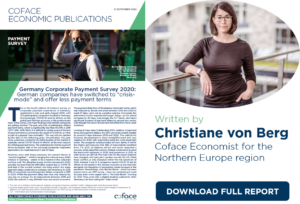German companies want to cash in as early as possible, according to the fourth edition of Coface’s survey on corporate payment experience in Germany.
Conducted in July and early-August 2020, with 753 participating companies located in Germany. Unsurprisingly, COVID-19 and its effects on the global and German economy is the predominant topic of this survey. One major finding is that German companies are getting worried: companies became cautious in providing payment terms to their clients and less companies are offering payment terms overall and these have shortened, even drastically in some sectors.
German companies have switched to “crisis-mode” offering shorter payment terms
The main risks for the export-business have changed a lot. Last year’s number-one risk, the U.S.-China trade conflict, is only marginal within the risk spectrum of 2020. Instead, 3 out of 4 companies named COVID-19 and its effects on the global or the German economy as the main risk, alongside the disruption of production chains because of the pandemic. Nevertheless, risks like the Brexit – which is present since our 2017 survey – have not vanished and could become even more urgent with a “No-Deal-Brexit” looming for 2021. Thus, even with a slightly brighter outlook for 2021, Germany is far from exiting the “crisis-mode”.

Payment terms: Cash is king
- The average payment term decreased by 3 days, from 37 days in 2019 to 34 days in 2020.
- Only 62% of our participants answered that they offered payment terms in 2020. In the four previous years, over 80% of surveyed companies offered payment terms.
- Short-term credit periods (0 to 30 and 30 to 60 days) dominate the German business landscape: half of the companies requested payments to be made between 0 and 30 days.
- 100% of participants in the construction sector answered that they offered payment terms between 0 and 30 days stands out, bringing the average payment term in this sector to the minimum of 15 days.
- Automotive is the most generous sector in 2020, with an average payment term of 43.8 days.
- The biggest change occurred in the pharma-chemicals sector, where payment terms were reduced by almost 18 days to 31.7 days.
Payment delays: companies get their money faster
- In 2020, 68% of our surveyed participants reported payment delays compared to 85% in 2019.
- The average overall payment delay time decreased by almost 2 days, from 37.7 days in 2019 to 35.9 days in 2020.
- The reasons behind payment delays overall are mainly related to financial difficulties (48% in 2020).
- 9% of participants named COVID-19 explicitly as the main reason for payment delays.
- Sales outstanding (DSO) decreased sizeably by around 9 days, from 65.8 days in 2019 to 56.5 days in 2020.
Economic expectations: 2020 – a year of pessimism and uncertainty
- While old risks have not vanished and still threaten the activity of German companies, COVID-19 and its effects is the overwhelming topic in 2020, especially for the export business.
- 39% of all respondents expect better business conditions in 2021 compared to 2020, 14% are pessimistic for 2021.
- 3 out of 4 companies named COVID-19 and its effects on the global or the German economy as the main risk, alongside the disruption of production chains because of the pandemic.
- 91% of the respondents consider the domestic market to be the market with the biggest business opportunities (vs. 81% in 2019).
- 1 company out of 2 has benefited from State aids and especially, the short-time work compensation.
Download the full ten page report, written by Christiane von Berg Coface Economist for the Northern Europe region, based in Mainz, Germany.
Methodology:
This is the fourth edition of Coface’s survey on corporate payment experience in Germany, conducted in July and early-August 2020, with 753 participating companies located in Germany major sectors[2].
